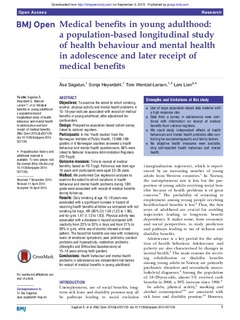Medical benefits in young adulthood: a population-based longitudinal study of health behaviour and mental health in adolescence and later receipt of medical benefits
Journal article, Peer reviewed
Permanent lenke
http://hdl.handle.net/11250/298613Utgivelsesdato
2015Metadata
Vis full innførselSamlinger
Originalversjon
Sagatun, Å., Heyerdahl, S., Wentzel-Larsen, T., & Lien, L. (2015). Medical benefits in young adulthood: a population-based longitudinal study of health behaviour and mental health in adolescence and later receipt of medical benefits. BMJ open, 5(5), e007139.Sammendrag
Objectives To examine the extent to which smoking, alcohol, physical activity and mental health problems in 15–16-year-olds are associated with receipt of medical benefits in young adulthood, after adjustment for confounders.
Design Prospective population-based cohort survey linked to national registers.
Participants In the ‘Youth studies’ from the Norwegian Institute of Public Health, 15 966 10th graders in 6 Norwegian counties answered a health behaviour and mental health questionnaire; 88% were linked to National Insurance Administration Registers (FD-Trygd).
Outcome measure Time to receipt of medical benefits, based on FD-Trygd. Follow-up was from age 18 years until participants were aged 22–26 years.
Method We performed Cox regression analyses to examine the extent to which variations in health behaviour and mental health problems during 10th grade were associated with receipt of medical benefits during follow-up.
Results Daily smoking at age 15–16 years was associated with a significant increase in hazard of receiving health benefits at follow-up compared with not smoking for boys, HR (95% CI) 1.56 (1.23 to 1.98), and for girls 1.47 (1.12 to 1.93). Physical activity was associated with a decrease in hazard compared with inactivity from 23% to 53% in boys and from 21% to 59% in girls, while use of alcohol showed a mixed pattern. The hazard for benefits use rose with increasing levels of emotional symptoms, peer problems, conduct problems and hyperactivity–inattention problems (Strengths and Difficulties Questionnaire) at 15–16 years among both genders.
Conclusions Health behaviour and mental health problems in adolescence are independent risk factors for receipt of medical benefits in young adulthood.

